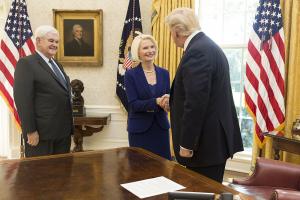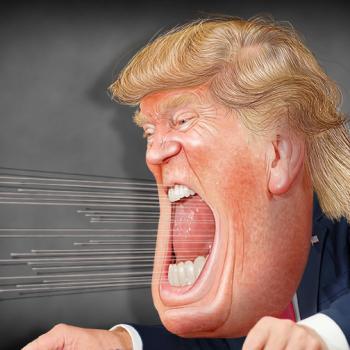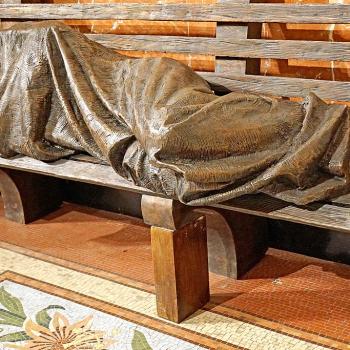
When Trump went to the United Nations, he pretended to be interested in religious liberty. He gave the claim that religious liberty is being weakened around the world, and that the United States wants to do what it can to overcome religious persecution. It is in this spirit, that the Ambassador to the Vatican, Callista Gingrich, with Mike Pompeo, are at a symposium at the Vatican, “Pathways to Achieving Human Dignity: Partnering with Faith-Based Organizations,” which is said to promote religious liberty.
To paraphrase the Princess Bride, Trump, Gingrich, and Pompeo keep using words which they don’t understand.
The United States, especially under the Trump Administration, does not favor religious liberty; rather, they prefer to give preferential favoritism to a few particular religious groups while neglecting, or outright hindering, others. Religious liberty is for all. Saying that they sponsor and promote the freedom of some Christians (not all) to act as they wish in the United States is not the same thing as to promote religious liberty. To sponsor and promote those same few Christian groups around the world is not to promote religious liberty.
The Vatican II Document, Dignitatis humanae, explains what religious liberty entails:
This Vatican Council declares that the human person has a right to religious freedom. This freedom means that all men are to be immune from coercion on the part of individuals or of social groups and of any human power, in such wise that no one is to be forced to act in a manner contrary to his own beliefs, whether privately or publicly, whether alone or in association with others, within due limits.[1]
Governments, it tells us, must not prohibit religious acts:
There is a further consideration. The religious acts whereby men, in private and in public and out of a sense of personal conviction, direct their lives to God transcend by their very nature the order of terrestrial and temporal affairs. Government therefore ought indeed to take account of the religious life of the citizenry and show it favor, since the function of government is to make provision for the common welfare. However, it would clearly transgress the limits set to its power, were it to presume to command or inhibit acts that are religious. [2]
There must be no threats, no coercion, coming from political authorities to hinder religious liberty. “Religious communities also have the right not to be hindered in their public teaching and witness to their faith, whether by the spoken or by the written word.” [3] Indeed, governments are expected to help people of religious faith to feel welcome and to be prosperous in civil society. They should not normally be forced to act against their religious convictions (obviously, there are limits, such as when a religious group teaches actions which go against the common good, and indeed, promotes something barbaric like human sacrifice; then governments can and should step in, because such sentiments and actions go against any authentic, positive religious sentiment). The foundation for religious liberty lies, in part, in the dignity of the human person. As this goes to one of the hearts of the Christian message, Christians must adherer to and promote religious liberty for all:
The declaration of this Vatican Council on the right of man to religious freedom has its foundation in the dignity of the person, whose exigencies have come to be are fully known to human reason through centuries of experience. What is more, this doctrine of freedom has roots in divine revelation, and for this reason Christians are bound to respect it all the more conscientiously. [4]
Likewise, then, Nostra Aetate declared:
The Church reproves, as foreign to the mind of Christ, any discrimination against men or harassment of them because of their race, color, condition of life, or religion. On the contrary, following in the footsteps of the holy Apostles Peter and Paul, this sacred synod ardently implores the Christian faithful to “maintain good fellowship among the nations” (1 Peter 2:12), and, if possible, to live for their part in peace with all men, so that they may truly be sons of the Father who is in heaven.[5]
Under the Trump Administration, the United States has not been fostering authentic religious liberty around the world. Indeed, as some have noted, it is acting against religious liberty. It is true, when some Christians suffer at the hands of non-Christian governments, the United States issues a complaint, but that is due to favoritism in response to those Christians and not due to religious liberty. For the United States is not taking active interest in promoting religious liberty among its allies, such as Saudi Arabia, nor does it promote religious liberty within the United States itself. The so-called Muslim Ban aimed to restrict Muslims from the United States, used a religious qualification as a way to discriminate against potential immigrants and visitors to the United States. Likewise, Betsy DeVos has threatened to cut funding to universities for teaching positively about Islam (while having no problem if Islam is denigrated and maligned). Christians, who believe it is their duty to help migrants, have been arrested, finding the United States is acting against their freedom to help those in need. Christian protestors against the inhumane treatment of migrants and asylum seekers have also been arrested, finding their freedom of speech has been impugned. Instead of promoting religious liberty, the United States is turning the notion upside-down, imploring liberty only for those who follow the ideology of the current administration, which is exactly the opposite of what religious liberty entails.
Don’t let Trump, Gingrich, and Pompeo fool you. They are not promoters of religious liberty, just as Saudi Arabia, promoting forms of Islamic belief is not a promoter of religious liberty. They are trying to make themselves look like the protectors of Christians, but if one follows their policies, Christians would have to ignore their faith to receive protection. Christians must take note. They should not accept any Faustian deal with Trump. They should note that Trump is actively working against religious liberty, and if and when Trump no longer finds them useful, he will turn on them as he does on everyone else.
[1] Dignitatis humanae. Vatican Translation. ¶2.
[5] Nostra Aetate. Vatican Translation. ¶5.
Stay in touch! Like A Little Bit of Nothing on Facebook.
If you liked what you read, please consider sharing it with your friends and family!













